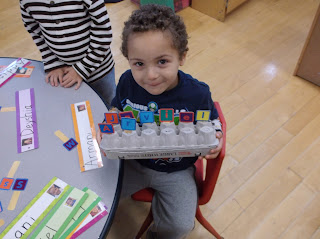During the month of October we will be exploring trees, the parts of a tree, how does a tree grow? Why do leaves change color? What foods grows on trees? Who lives in tree?
Friday, October 2, 2015
Friday, September 4, 2015
First week of school
I must say I have the cutest little people on the planet this year! A lot of three year olds this year (which I love) which means it might take a little longer to get down to basics to establishing classroom management!
The first day for centers I had water colors for art, computers open, dramatic play, dry erase boards markers and letter dice for writing, colored school manipulatives for math and discovery boards for science, blocks open, library open! I kept centers same for a couple days switched to play dough, and rotated math manipulatives. We had a few criers the first few days but by day three everyone had smiles! At circle time I went over class schedule, introduced jobs, we sang Hickety pickety bumble bee and the bean bag dance! Then I introduced centers, how to ask for a turn, and showed them the timer when it would be time to clean-up!
During centers I sat with students and got to know them asking them questions about their family, and what they like!At story we read these books! 

We took a tour of the classroom going over all the different centers, then toured the school as well! We may do it all again next week! Repetition is key in pre-k!
Monday, August 10, 2015
Teachable moments
In all my years of teaching I have to say some of my best activities haven't been planned but happened spontaneously! Sometimes I have an epiphany in the car on the way to school, I see a cardboard box, material I found at home or at school, or the students will inspire an idea! The trick is not to worry about the "theme" you are teaching but the experience of learning you are modeling for your students ! Great teaching can't be found on TPT, or Pinterest! You can get inspiration from them but the meaningful learning experience come from you, the questions you ask, the level of enthusiasm you bring, and your knowledge of developmental learning! We are all individuals who learn differently. Each activity you do should reflect your students prior knowledge and development and interest!
So many teachers teach to a theme and spend hours and ink replications that are not that meaningful to children! I used to be one of them! In my opinion and experience it's a waste of time and ink! The more dimensional and sensory learning is the more students are going to remember the experience! This quote inspired me to share my thoughts!
Tuesday, June 23, 2015
ABC center
Salt writng
Easel Writing
Building letters
Using Letter tiles to build words and names
Using letter sticks to build names and words
Easel Writing
Building letters
Using Letter tiles to build words and names
Using letter sticks to build names and words
Saturday, June 6, 2015
Insect unit of study
Life Science Standard
- Recognize that animals (including humans) and plants are living things that grow, reproduce, and need food, air, and water.
- Describe ways in which many plants and animals closely resemble their parents in observed appearance.
- Identify the ways in which an organism’s habitat provides for its basic needs (plants require air, water, nutrients, and light; animals require food, water, air, and shelter).
- Recognize that plants and animals have life cycles, and that life cycles vary for different living things.
Insects have parts! Learning concept through play dough and building an insect using materials on the classroom! Also insects need food to live, we tried using a proboscis like a bee and butterfly and a mandible like and ant! Bring an insect is hard work!

Wednesday, April 8, 2015
Animals that lay eggs
Speaking and Listening:

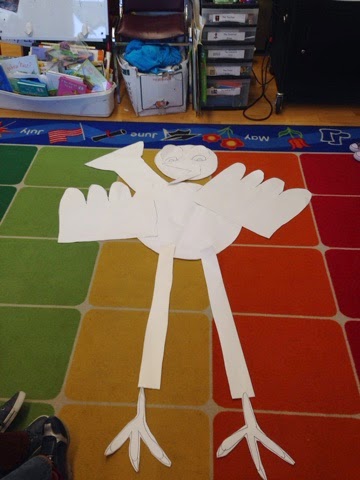
Birds have parts. How are birds different from people and other animals?

What animals hatch from eggs? Record and compare data.
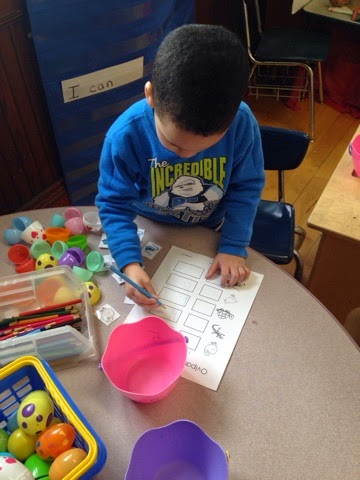

Drawing birds details and label parts of a bird.

What letter is hatching game? Letter and sound Identification and letter formation.

Why do birds make nests? Where do birds live?
Create and describe birds habitats

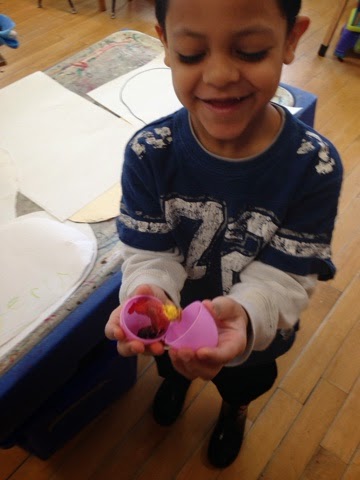
Demonstrating how birds eat and use their beaks.


Writing activity , draw and write about an animals that lays eggs.


Observing differnt birds.
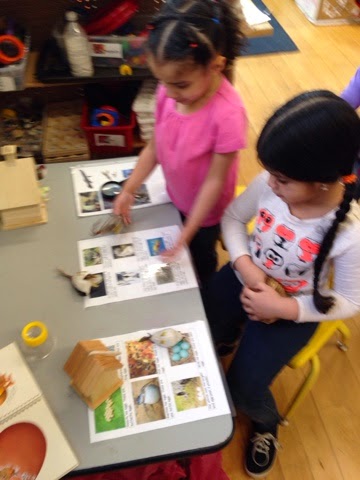
- Describe personal experiences; tell real or imagined stories
| Life Science: |
- Recognize that plants and animals have life cycles, and that life cycles vary for different living things.
- Describe ways in which many plants and animals closely resemble their parents in observed appearance.
- Recognize that people and other animals interact with the environment through their senses of sight, hearing, touch, smell, and taste.


Birds have parts. How are birds different from people and other animals?

What animals hatch from eggs? Record and compare data.


Drawing birds details and label parts of a bird.

What letter is hatching game? Letter and sound Identification and letter formation.

Why do birds make nests? Where do birds live?
Create and describe birds habitats


Demonstrating how birds eat and use their beaks.


Writing activity , draw and write about an animals that lays eggs.


Observing differnt birds.

Saturday, March 7, 2015
Whale unit of study
We have Nike the humpback whale coming to visit this Friday so we are trying to learn all about him! Creating a whale with all its parts using paper plates,whale watching, watching videos studying whale behavior and listening to sounds the make! Whale watching in dramatic play! The students watched a video on a rescue of a whale trapped in fishing net and wanted to recreate the video and try to feel what it was like to be trapped!
Social studies: We explored whale watching on a ship.
OH no one of the whales got trapped in netting we have to rescue them!
This was just awesome! We got to go learn and observe the humpback whale inside and out.
Social studies: We explored whale watching on a ship.
OH no one of the whales got trapped in netting we have to rescue them!
This was just awesome! We got to go learn and observe the humpback whale inside and out.
Subscribe to:
Comments (Atom)


























